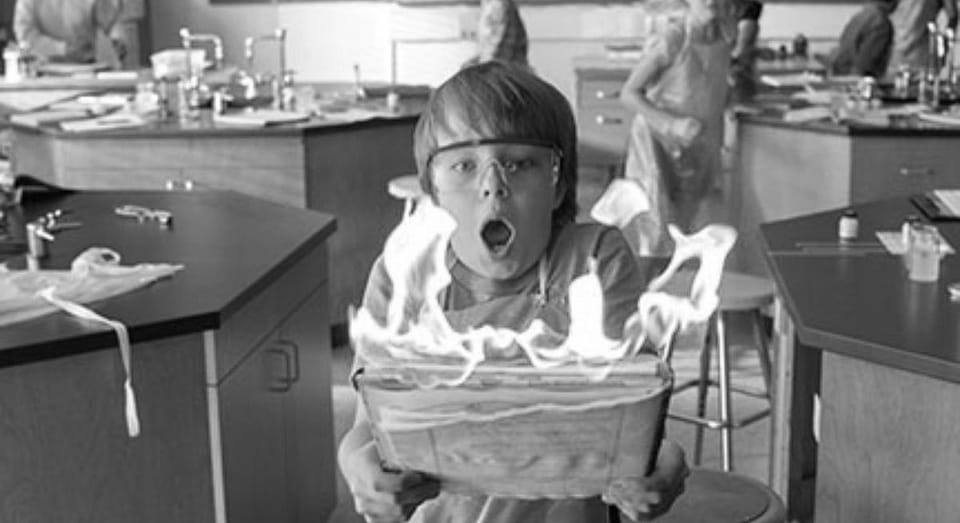Kristaps Porzingis and the Terrible, Horrible, No Good, Very Bad Day

For much of the second half, pundits have been labeling Kristaps Porzingis as the team's most important player and/or its secret weapon. Neither is true, of course, but games like Feb. 11th in Miami have painted that picture. In that game, Porzingis was 8-for-14 from the field and 7-for-9 at the line, notching 25 points, nine rebounds, three assists, and two blocks, in a 110-106 win. It seemed like Miami had no answers for him, and when he shot 7-for-13 in Game 1 – including a pretty step-back three – that viewpoint became even more ingrained. Unfortunately, Erik Spoelstra spent the last two days uncorking a scheme to flip Porzingis' strengths into weaknesses, and neither he nor Joe Mazzulla responded. As a result, the series is now tied, and the C's are suddenly in a terrible place – Spoelstra has two more full days to work on schemes, with the series heading back to Miami.
What Miami did to blunt Porzingis on D was far more important, but let's start on offense. The Heat continuously baited the C's into lobbing the ball to Porzingis in the post by not fronting him, only to come around the side once the ball got in the air. If Porzingis did catch the ball, they brought multiple defenders to overwhelm him. Porzingis only had two turnovers, but that was because there were a few times when Miami stole the ball before he even touched it. The effect was that the C's stopped moving the ball, and the offense got stuck in the mud of matchup hunting and isolation plays. It didn't work. But that wasn't the real problem.
The real problem was what Miami did on offense. They stopped taking two-point shots. This season, 39.4% of Miami's field goal attempts came from three-point range. That .394 3PAr (literally the percentage of field goal attempts from three-point range) ranked right in the middle of the pack – 14th out of 30 teams. Tonight, they took 43 of 75 shots from three-point land (57%), but even that obscures their strategy. In the first quarter, they took three of their first five shots from inside the arc. They then hoisted eight consecutive threes, hitting four. At that point, Duncan Robinson had a lay-up blocked, and then the Heat finished the quarter taking five more threes. Miami finished the quarter with four two-point attempts and 15 three-point attempts, hitting nine of them.
Throughout this, Porzingis was playing drop coverage, which led to a lot of wide open shots for Miami shooters. The Celtics either weren't ready for this, or refused to respect Miami's strategy. Either way, Miami burned them, and set the tone for the game. The Celtics didn't adjust until late in the third quarter, and you might not even call it an adjustment. It could very easily be characterized as them just taking out Porzingis at his normal rest time. He would come out with 3:18 left in the third when Miami had taken their largest lead to go up 82-70. Over the next nine minutes and 40 seconds of game time, the C's would claw their way back in it. When Porzingis was re-inserted with 6:22 remaining in the fourth, it was a five-point game at 94-89.
During Porzingis' time on the bench, the C's were able to get out and guard tighter on the perimeter, and forced Miami into tougher shots. Miami shot just 5-for-13 overall, and just 2-for-6 from three. Taken in the aggregate, this was great defense. Unfortunately, Miami was 2-for-9 and then Bam Adebayo hit three of Miami's next four shots on plays where Al Horford looked slightly overmatched. It seemed like they would maybe go to this every time down the stretch. So in back came Porzingis, and the aggressive defense ceased. Miami recognized it immediately, and both Haywood Highsmith and Jaime Jazquez Jr. took advantage, drilling threes on consecutive possessions. Suddenly, a five-point game was a nine-point game, and the C's never truly threatened again.
This loss wasn't entirely on Porzingis, to be clear. Jayson Tatum came out flat in the third quarter, and played very lazy defense on a couple of early possessions where Miami took advantage and built up a real lead. Jrue Holiday continued his season-long trend of missing shots close to the rim. Payton Pritchard didn't look for his shot at all, and Derrick White didn't look for his until the fourth quarter. But most of that pales in comparison to how bad Porzingis was. He was a game-low -32, and you felt every bit of it.
Tonight, both Jaylen Brown and Jayson Tatum both scored 20+ points and both shot 50% or better from the field. Tonight was the 61st game in which Brown and Tatum – counting both regular season and playoffs – both scored 20+ points and the Celtics lost. But it was just the ninth time in which they both scored 20+ points, both shot 50% or better from the field, and the C's lost. Nine times across seven seasons. That's the kind of outlier this game was. You will not be surprised to learn that one of the prior eight times was Game 2 of the 2020 Eastern Conference Finals in the Bubble against Miami. The only other playoff game in the group? Game 1 of last year's Eastern Conference Semifinals vs. Philly. I would characterize all three of these games as stupid losses, and they should be bright, flashing warning signs for Boston.
The fact that tonight's game is an outlier is not of much comfort, because with another two days to flip the script once again, Spoelstra may have a completely different plan for Game 3. After Game 3, the series moves to every other day, leaving Spoelstra less time to prepare, and his undermanned team less time to rest. But Game 3 is now an incredibly important game. Ultimately, this game hasn't shifted my viewpoint of who will win this series. But if Boston loses Game 3, it means the series will go at least six games, and possibly seven, and that is just going to make the road to Banner 18 that much tougher. Joe Mazzulla and his coaching staff need to figure out how to make sure Kristaps Porzingis is not so easily taken advantage of in Game 3, or be prepared to leave him on the bench. This Celtics team won plenty of games without Porzingis this season.
